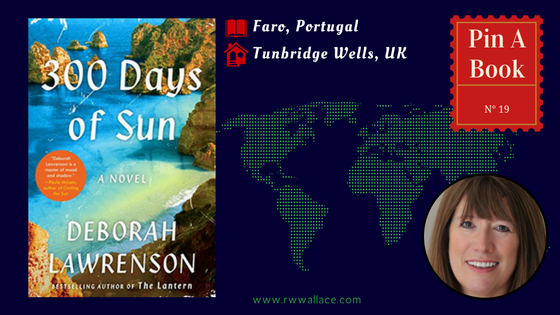
I’m kicking off the new year with a book promising 300 days of sun – sounds like a good idea in the middle of winter, doesn’t it? Deborah Lawrenson takes us to Faro, Portugal in her novel, 300 Days of Sun. Another pin on the map!
How did the setting of your story impact your writing?
 The idea for the novel grew from a stay in Faro. I loved the elegant but slightly shabby buildings and wanted to find out more about them. It was a town that tourists usually passed by, and yet it had so much to offer, from the sea marsh islands to the chapel lined with skulls and bones at the Largo do Carmo. I knew it would make a fabulous – and unusual – setting for a novel.
The idea for the novel grew from a stay in Faro. I loved the elegant but slightly shabby buildings and wanted to find out more about them. It was a town that tourists usually passed by, and yet it had so much to offer, from the sea marsh islands to the chapel lined with skulls and bones at the Largo do Carmo. I knew it would make a fabulous – and unusual – setting for a novel.
How or why is the setting important to who your character is?
The gentle decay and the sea marshes became a metaphor for one of the main themes of the novel: the process of change. All the characters in the story experience life-altering change – and the world around them is unstable, too. War and economic and political power-shifts undermine the individual. Violent storms re-draw coastal geography. Nature cannot be contained even with modern sea-barrier engineering that is supposed to keep the islands and marshes stable where the forces of the Atlantic and the Mediterranean meet.
Which location did you enjoy writing the most in your story? Why this one?
The desert island – always exciting! Across the marsh channels of the Ria Formosa, the Ilha Deserta is an exposed sun-blasted curl of beach in the sea, and feels much further away than the short ferry boat ride.
When you visited France, which location did you prefer? Why?
I am lucky enough to have a second home in the South of France, in the glorious Luberon valley. Though I am an adoring Francophile, and enjoy exploring all parts of the country, I always love to return to Provence.
Why? The light and the colours, the heat, the scents, the fruit and wine, and the relaxed outdoor life throughout the long summer.
What gave you the greatest cultural shock when in France?
The speed people drive on twisty hillside roads! I still find it unnerving.
Which part of the French archetype did you discover to be wrong? Right?
The myth in Britain is that the French don’t appreciate our role in the WW2 liberation of France. The Luberon was a bastion of the Resistance, and there is huge respect in this region for the RAF and its dangerous work in supporting them, dropping supplies and making clandestine landings. So much so that I wrote a novel based on some of the stories I heard – The Sea Garden.
Please note that Amazon links are affiliate links. You’ll pay the same price for anything you order, but I will earn a small commission.
